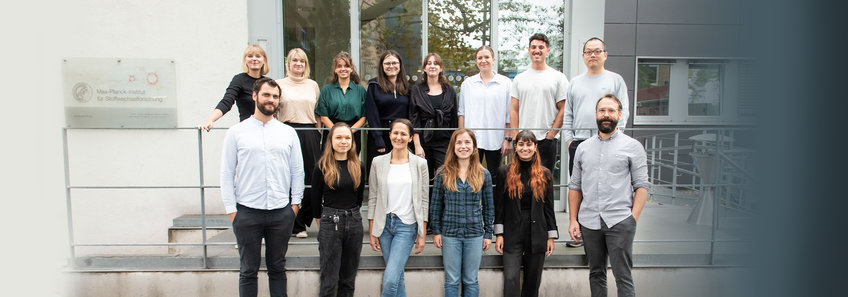
Publications of Günter Mies
All genres
Journal Article (33)
1.
Journal Article
Longitudinal assessment of infarct progression, brain metabolism and behavior following anterior cerebral artery occlusion in rats. Journal of Neuroscience Methods 253, pp. 279 - 291 (2015)
2.
Journal Article
Heterozygosity for the mutated X-chromosome-linked L1 cell adhesion molecule gene leads to increased numbers of neurons and enhanced metabolism in the forebrain of female carrier mice. Brain Structure and Function 218 (6), pp. 1375 - 1390 (2013)
3.
Journal Article
Vascular endothelial growth factor promotes pericyte coverage of brain capillaries, improves cerebral blood flow during subsequent focal cerebral ischemia, and preserves the metabolic penumbra. Stroke 44 (6), pp. 1690 - 1697 (2013)
4.
Journal Article
Hyperlipidemia attenuates vascular endothelial growth factor-induced angiogenesis, impairs cerebral blood flow, and disturbs stroke recovery via decreased pericyte coverage of brain endothelial cells. Arteriosclerosis, Thrombosis, and Vascular Biology 33 (7), pp. 1561 - 1567 (2013)
5.
Journal Article
Conflict processing in the rat brain: Behavioral analysis and functional μPET imaging using [ 18F]fluorodeoxyglucose. Frontiers in Behavioral Neuroscience 6, 4 (2012)
6.
Journal Article
Whiskers area as extracerebral reference tissue for quantification of rat brain metabolism using 18F-FDG PET: application to focal cerebral ischemia. Journal of Nuclear Medicine 52 (8), pp. 1252 - 1260 (2011)
7.
Journal Article
Leptin augments cerebral hemodynamic reserve after three-vessel occlusion: distinct effects on cerebrovascular tone and proliferation in a nonlethal model of hypoperfused rat brain. Journal of Cerebral Blood Flow and Metabolism 31 (4), pp. 1085 - 1092 (2011)
8.
Journal Article
Distinct spatiotemporal patterns of spreading depolarizations during early infarct evolution: evidence from real-time imaging. Journal of Cerebral Blood Flow and Metabolism 31 (2), pp. 580 - 592 (2011)
9.
Journal Article
Oxygen therapy improves energy metabolism in focal cerebral ischemia. Brain Research 1415, pp. 103 - 108 (2011)
10.
Journal Article
Changes of cerebral blood flow during the secondary expansion of a cortical contusion assessed by 14C-iodoantipyrine autoradiography in mice using a non-invasive protocol. Journal of Neurotrauma 25 (7), pp. 739 - 753 (2008)
11.
Journal Article
Shut-down of translation, a global neuronal stress response: mechanisms and pathological relevance. Current Pharmaceutical Design 13 (18), pp. 1887 - 1902 (2007)
12.
Journal Article
Establishing a photothrombotic 'ring' stroke model in adult mice with late spontaneous reperfusion: quantitative measurements of cerebral blood flow and cerebral protein synthesis. Journal of Cerebral Blood Flow and Metabolism 26 (7), pp. 927 - 936 (2006)
13.
Journal Article
Role of blood flow for secondary contusion growth after CCI in mice. Journal of Neurotrauma 23 (5), p. 770 - 770 (2006)
14.
Journal Article
Therapeutically induced arteriogenesis in the brain. Nervenarzt 77 (2), pp. 215 - 220 (2006)
15.
Journal Article
Spreading depression activates unfolded protein response. Neuroscience Letters 368 (1), pp. 37 - 40 (2004)
16.
Journal Article
Granulocyte-macrophage colony-stimulating factor-induced arteriogenesis reduces energy failure in hemodynamic stroke. Proceedings of the National Academy of Sciences of the United States of America 101 (34), pp. 12730 - 12735 (2004)
17.
Journal Article
Characterization of a novel chronic photothrombotic ring stroke model in rats by magnetic resonance imaging, biochemical imaging, and histology. Journal of Cerebral Blood Flow and Metabolism 24 (7), pp. 789 - 797 (2004)
18.
Journal Article
Multiparametric analysis of brain injury following transient focal cerebral ischemia in mice. Stroke 35 (6), p. E246 - E246 (2004)
19.
Journal Article
Immunohistochemical analysis of protein expression after middle cerebral artery occlusion in mice. Acta Neuropathologica 107 (2), pp. 127 - 136 (2004)
20.
Journal Article
Anatomic considerations in therapeutic arteriogenesis for cerebral ischemia - Response. Circulation 109 (2), p. E4 - E4 (2004)